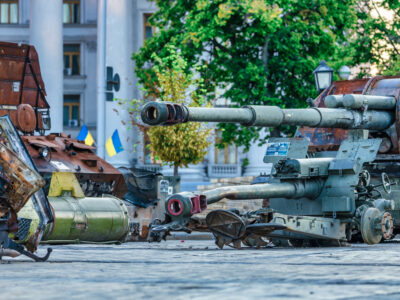Few instances illustrate better than this one why the United States will never win the war against terrorism. This non-attack also reflects a variety of other realities of war in the 21st century, ones that all but guarantee failure in the war against Islamic terrorists. Such realities are well known to specialists, and none of the points we wish to review are new. However, it is important to consider their collective weight.
First, avoiding civilian casualties at all costs is unquestionably a humane and just policy. The operative words are “at all costs,” and it is universally, if tacitly, understood that such an injunction does not apply to terrorists, but only to Western nations and especially to the United States and Israel. Further, it is nearly unthinkable that Western populations and their leaders would countenance war on the scale that was waged against Japan and Germany during World War II. The example of the war against Japan was brought up for this reason. Japanese soldiers were every bit as fanatical as their modern counterparts lurking in caves and training in deserts, and it took a series of unmitigated catastrophes to subdue their fascist regime. But that was then and now is now. The required mobilization of public opinion and resources to conduct a similar campaign today is well nigh incomprehensible.
The second reality of modern war is a global ideological pandemic known as anti-Americanism. The political left deems the United States a greater threat to peace than the Osama Bin Ladens of the world. Indeed, a majority of Europeans seem more interested in soccer, social welfare benefits, and America-bashing—not necessarily in that order—than they do anything else. Generally, the first inclination of any given European leader when confronted by a threat is to call a conference. In the summer of 2006, I once asked a very prominent official in the EU (I prefer to keep the person anonymous) what would likely happen if, say, a resurgent Russia invaded Ukraine and continued rumbling westward. The official’s response was classic: “Why, we’d call a meeting, of course.” That answer, I thought, spoke volumes. By implication, what that Eurocrat and his ilk were not interested in was defending themselves with anything besides a handful of magic markers and a PowerPoint presentation.
A third reality of war in this century is lack of conviction that one’s nation is in fact at war. About half of the American populace and a large majority of its symbol-producing elite—journalists, academics, entertainment moguls, and political leaders—believe that the main enemy of peace is George Bush.
The fourth reality is multiculturalism and its attendant moral relativism. Multiculturalism is a sort of politically acceptable treason, the nice, fluffy, Kumbaya kind, in which no culture can claim moral superiority, and therefore none, but especially the West, can justify self-defense.
The fifth reality is that three of the most fanatical regimes on the planet, Saudi Arabia, Syria, and Iran, are perpetrators and safe havens for terrorism, they despise the West, and that is all there is to it. The United States cannot consider conquering these countries for all the reasons cited above, but also because at least two of them through an accident of geography possess something that modern industrialized countries need, whereas Japan during World War Two did not.
Again, none of these observations are new, everyone is aware of them, but their combined effects leave America and our European allies in a sorry state. This is why the war against terrorism, as presently waged, will not be won.





Pingback: Designing history: The identity of the 21st century | Center for Vision and Values - A conservative think tank promoting truth and liberty through a vision of faith and freedom.